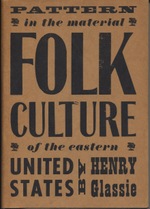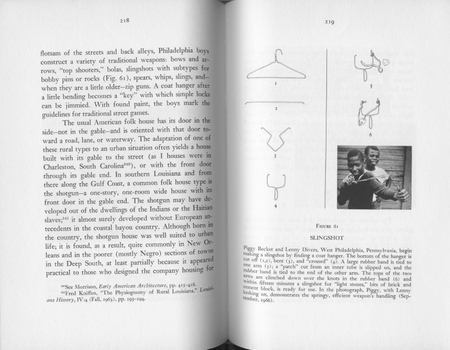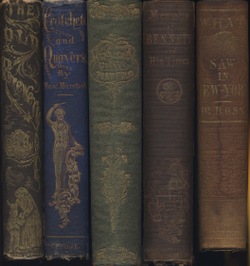Over the winter, Peter and I attended all three installments of Tom Stoppard’s Coast of Utopia, in the course of which I learned a great deal about the literary history of 19th-century Russia and international anarchism, and came to the realization that what I really want to do with my life is dress like Ivan Turgenev.
Despairing of that, however, I have settled for reading some of his books. At the Strand I happened onto a $10 Cresset Library edition of A Sportsman’s Notebook from 1950, in Charles and Natasha Hepburn’s translation, which I enjoyed, even in its occasional lushness:
It was a marvellous picture: around the fires a circle of reddish, reflected light trembled and seemed to die away into the darkness; at times the flame blazed up and scattered swift gleams beyond the edges of the circle; a thin tongue of light licked the bare willow-twigs and disappeared in a flash— long, sharp shadows, bursting in for a moment in their turn, ran right up to the fires: it was the war of darkness with light.
There are many such passages, and for them to work, there has to be a consistency of tone. My sense was that they did work, that the Hepburns’ intermittent florid touches did not damage the essential delicacy of the prose. I moved on to a Novel Library edition of First Love and Rudin, also from 1950, mostly because I’m the sort of book-collecting aesthete who likes the dainty Novel Library editions, but also because Isaiah Berlin had translated First Love. Alec Brown did Rudin, and I liked his translation even better than Berlin’s, if that’s possible. To be honest, though, I was only reading for pleasure, and wasn’t too worried about translations.
But then I came to Fathers and Sons, and for some reason, I grew fussy. You would think that determining which is the best translation of a foreign-language classic would be the sort of task the internet would be good at. But it isn’t, really; there’s no such category at Metacritic. Not even searching a scholarly archive like JSTOR helped, because the academics make a point of not knowing about translations, lest anyone think they read foreign-language books in anything but the original. So I stayed up late one night, consulting various versions of the opening page of Fathers and Sons, by means of Amazon’s Search Inside function and Google Books, trying to figure out which translation I wanted to read. By now I knew what I liked about Turgenev — the unobtrusively telling detail, the mild irony, the as-if-overheard quality of the dialogue. I liked Constance Garnett’s version of the opening page, but for some reason I had it in my head that since this was Turgenev’s best-known work, there had to have been some improvement in the translation of it since hers. I ended up choosing Bernard Guilbert Guerney’s, which the Modern Library published in 1961.
Now I should say up front that this is not a tale with a villain. Guerney’s is by no means a poor translation. But it’s sort of a loud one, by which I mean that the reader is often made aware that a translator has translated it. This began to bother me in chapter 6, in an exchange between the hero’s uncle, Pavel Petrovich Kirsanov, and the nihilist Bazarov about science:
“Physics is your particular study, isn’t that so?” Pavel Petrovich inquired in his turn.
“Physics, yes; and natural sciences in general.”
“They say the Germans have achieved great success in that field of late.”
“Yes, we could go to school to the Nemtzi for such things.”
Pavel Petrovich had used the term Germans in lieu of the common Nemtzi [tongue-tied ones] out of irony which, however, had been entirely wasted. (Trans. Guerney)
I found this unwieldy, not least because of the bracketed annotation “[tongue-tied ones],” whose relevance I couldn’t quite see. If Nemtzi was the common word for “Germans,” why hadn’t it been translated as “Germans”? Guerney’s rendering required the reader to pause and re-read the dialogue, replacing the word “Germans” with some sort of mental notation along the lines of ironic term for Germans that might be used by a proud dandy who’s been living too long in the provinces. Unfair to the reader! I went online and consulted Garnett. Her version:
“Is your special study physics?” Pavel Petrovitch in his turn inquired.
“Physics, yes; and natural science in general.”
“They say the Teutons of late have had great success in that line.”
“Yes; the Germans are our teachers in it,” Bazarov answered carelessly.
The word Teutons instead of Germans Pavel Petrovitch had used with ironical intention; none noticed it, however. (Trans. Garnett)
Teutons! Of course! English already has an ironic term for Germans that might be used by a proud dandy who’s been living too long in the provinces. Why hadn’t Guerney used it? My suspicion: he wanted to show off that he knew that “Nemtzi” literally meant “tongue-tied ones,” and to suggest that this etymology contributed to the Turgenev’s irony in the scene. But a translator’s showing off shouldn’t interrupt the flow of a scene. I ordered a copy of Garnett’s Fathers and Sons, also published by Modern Library, at once.
But before it could arrive, I discovered that the Novel Library also had an edition of the novel. Powerless against my bibliophilia, and having happy memories of Isaiah Berlin and Alec Brown, I ordered it, too. It turned out to have been translated by someone named George Reavey, who translated the dialogue thus:
‘Is physics your chief occupation then?’ Paul Petrovich inquired in turn.
‘Physics, yes; and the natural sciences in general.’
‘They say that the Teutons, of late, have done wonders in this domain.’
‘Yes, the Germans are our masters there,’ Bazarov replied casually.
Paul Petrovich had used the word ‘Teutons’ instead of ‘Germans’ with ironical intent, but this had passed unnoticed. (Trans. Reavey)
I liked this even better. There was no nonsense about “Nemtzi,” and the dialogue had a natural air that it didn’t in Garnett. To some extent this is a matter of taste, and also of one’s theory of translation. I happen to think that it’s not only fair play but necessary to re-order the words of a sentence when translating, particularly when translating from a language with genders and cases, such as Russian, to one without them, such as English. But such things give people like Milan Kundera the heebie-jeebies, FYI. (I wrote an article on this once, for Lingua Franca.)
Philistine that I am, I was entirely capable of choosing to read George Reavey’s version because the Novel Library edition was cuter than the others, even if I hadn’t thought the translation was better, too. In any case, I started the novel over, from the beginning, and read happily away in Reavey’s Turgenev, about the poignant-because-a-bit-ridiculous affection of Nicholas Petrovich for his son Arcady, about Arcady’s hero-worship of the somewhat brutish Bazarov, about the impossible dignity of Arcady’s uncle Pavel Petrovitch. And all was well, I was very happy, until I came to Madame Odintzov.
Madame Odintzov was a little older than Arcady; she had turned twenty-nine, but in her presence he felt himself a schoolboy, a young student, as though the difference of years between them were much greater. . . . Her nose, like that of most Russians, was a trifle thick, and her complexion matt; for all that, Arcady decided that he had never met such an entrancing woman. (Trans. Reavey)
“Matt”? As a surface texture for a photograph, yes, but as a complexion on a human being, I couldn’t even picture it. But in a proximity dangerous for a compulsive like me, I now had two other translations for comparison.
| Madame Odintsov was a little older than Arkady— she was twenty-nine— but in her presence he felt himself a schoolboy, a little student, so that the difference in age between them seemed of more consequence. . . . Her nose— like almost all Russian noses— was a little thick; and her complexion was not perfectly clear; Arkady made up his mind, for all that, that he had never before met such an attractive woman. (Trans. Garnett) |
She was but a little older than Arcadii— going on twenty-nine— yet he felt like a schoolboy, like a freshman in her presence, just as if the difference in their ages were far more considerable. . . . Her nose— like the noses of almost all Russians— was a trifle bulbous, and her complexion was not altogether clear; for all that Arcadii decided that he had never encountered a woman so alluring. (Trans. Guerney) |
I didn’t like “bulbous” at all, and I didn’t think Madame Odintsov would, either. Nor did I like “freshman,” because the word seemed too specific to American society. And how old was she, anyway— twenty-nine or almost twenty-nine? But “not perfectly clear” seemed a more plausible adjective for a woman’s complexion than “matt”; in the suggestion of a flaw in Madame Odintsov’s beauty, Turgenev might have intended a touch of pathos. And to say that the difference in their ages seemed of more consequence was subtler than to say that it seemed greater. So perhaps Reavey’s wasn’t the platonic ideal of translation after all.
I went back to it nonetheless, though saddled, now, with the knowledge that I could at any time compare versions. Which I did. Here, for example, is another problematic passage, involving a colloquial phrase, in a discussion that Bazarov and Arcady have about Madame Odintsov:
‘A certain gentleman was just telling me that the lady in question was— “quite hot” but he looks a fool. Well? What is your opinion? Is she really— “quite hot?” ‘
‘I completely fail to grasp the allusion,’ Arcady replied.
‘Come, come! What innocence!’
. . . ‘Well?’ he asked when they were out in the street. ‘Are you still of the opinion that she is— “quite hot?” ‘
‘One can never tell! Just look at the way she has put herself on ice!’ Bazarov retorted . . . (Trans. Reavey) |
“A gentleman has just been talking to me about that lady; he said, ‘She’s— oh, fie! fie!’ but I fancy the fellow was a fool. What do you think, what is she!— oh, fie! fie!”
“I don’t quite understand that definition,” answered Arkady.
“Oh, my! What innocence!”
. . . “Well?” he said to him in the street; “are you still of the same opinion— that she’s . . .”
“Who can tell? See how correct she is!” retorted Bazarov . . . (Trans. Garnett) |
“A certain high-born gent was telling me just now that this lady is ‘My-my-my!’ But then the gentleman himself seems to be a nincompoop. Well, is she truly ‘My-my-my!’ in your opinion?”
“I don’t fully understand that definition,” Arcadii retorted.
“Come, now! What an innocent fellow!”
. . . “Well?” Arcadii questioned him when they were outside. “Is it still your opinion that she’s ‘My-my-my’?”
“Really, who knows what she’s like! Just see what an icicle she has turned herself into!” Bazarov retorted . . . (Trans. Guerney) |
There’s no way to win, in translating a colloquialism. A rendering that sounds successfully up-to-date now may sound like, well, “fie, fie,” a century later. But I think Reavey has the best of it here, because he’s the only one whose rendering of Arcady’s indignant retort (“I completely fail to grasp the allusion”) conveys that he of course does grasp it but is rebuking Bazarov’s vulgarity, and because Reavey manages to save the specificity of the ice imagery in the last line (Guerney’s icicle doesn’t quite sound idiomatic to me). Here’s another:
| Madame Odintzov continued to treat him like a younger brother: she seemed to appreciate his good qualities and youthful simplicity— and no more. (Trans. Reavey) |
Madame Odintsov treated him as though he were a younger brother; she seemed to appreciate his good-nature and youthful simplicity and that was all. (Trans. Garnett) |
Odintsova was still treating him as a younger brother: apparently what she appreciated about him was the geniality and simpleheartedness of youth— and that was all. (Trans. Guerney) |
Reavey seems to have fallen into an error: if Mme. Odintsov appreciates Arcady’s good qualities, there can’t be anything worth appreciating that she has overlooked. No doubt Garnett’s “good-nature” and Guerney’s “geniality” are closer to what Turgenev meant. (Let me confess here that I can neither speak nor read Russian; all of my inferences about accuracy are just that, inferences, made by parallax.) And for the sake of justice, here’s a round that Guerney seems to win. Bazarov is falling into cynicism about the supposed improvement in the lives of serfs:
‘As I was walking yesterday by the side of a fence, I heard some local lads bawling, instead of some old song, this new refrain: The appointed hour is drawing nigh,
And love comes welling to the heart. . . . That’s progress for you.’ (Trans. Reavey) |
“Yesterday I was walking under the fence, and I heard the peasant boys here, instead of some old ballad, bawling a street song. That’s what progress is. (Trans. Garnett) |
“I was going past a fence yesterday and I heard some of the local peasant boys, but instead of singing some old song they were bawling the latest cheap hit: ‘Now the faithful time is coming, the heart feels it is in love.’ Well, there’s your progress. (Trans. Guerney) |
When I read this sentence in Reavey’s version, I was baffled. I couldn’t figure out why Bazarov was mocking the song he heard. The lyrics were mediocre, but it wasn’t at all clear why they served as an occasion for an ironic remark on progress. Garnett provides the necessary cultural information— namely, that the boys are singing a trashy pop song, instead of a traditional folk ballad— but she leaves the song itself out, and its words matter, because Bazarov, given his plight at this stage in the story, probably found in them a further reason for cynicism. Of the three translators, here only Guerney fulfills all his duties, sketching out enough of the cultural context for us to understand the point of Bazarov’s sarcasm, and giving us a version of the jingle itself. But since, in the end, I did like Reavey’s version the best, I want to end on one of his triumphs. Katya and Arcady are discussing poetry:
‘I don’t like Heine,’ Katya said, with her eyes indicating the book in Arcady’s hands, ‘when he is either sarcastic or plaintive. I prefer his pensive and nostalgic moods.’
‘And I prefer his gibing tone,’ Arcady remarked.
‘That’s the residue of your sardonic turn of mind.’
(‘Residue!’ Arcady thought. ‘If only Bazarov could hear that!’) (Trans. Reavey) |
“I don’t like Heine,” said Katya, glancing towards the book which Arkady was holding in his hands, “either when he laughs or when he weeps; I like him when he’s thoughtful and melancholy.”
“And I like him when he laughs,” remarked Arkady.
“That’s the relics left in you of your old satirical tendencies.” (“Relics!” thought Arkady— “if Bazarov had heard that?”) (Trans. Garnett) |
“I have no love for Heine,” Katya spoke up, indicating with her eyes the book Arcadii was holding, “either when he laughs or when he weeps; I like him when he’s pensive and melancholy.”
“But I like him when he laughs,” Arcadii remarked.
“That’s because of the persistent old traces of the satirical tendencies in you.” (“Old traces!” Arcadii reflected. If Bazarov were to hear that!) (Trans. Guerney) |
“Residue” is a brilliant choice, because it has a little frisson of the chemistry lab to it, which would indeed have impressed the scientific Bazarov, and it suggests that Arcady is one of Katya’s experiments, a pleasantly ironic attitude for her to have toward him, who is only just beginning to take her seriously.





